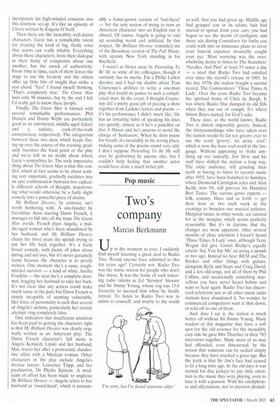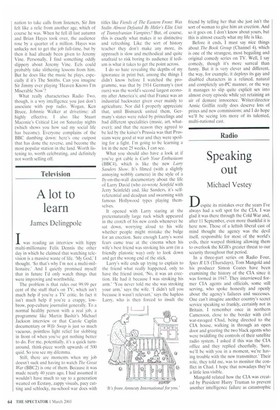Two's company
Marcus Berkmann
Up to the moment as ever, I suddenly find myself listening a great deal to Radio Two. Would anyone have admitted to this ten years ago? Certainly not. Radio Two was the music station for people who don't like music. It was the home of such towering radio talents as Ed `Stewpor Stewart and Sir Jimmy Young, whose wig was 13-8 favourite to succeed him when he finally retired. To listen to Radio Two was to admit to yourself, and maybe to the world
as well, that you had given up. Middle age had grasped you in its talons; hair had started to sprout from your ears; you had begun to see the merits of cardigans; and those ads during Countdown for baths you could walk into or insurance plans to cover your funeral expenses invariably caught your eye. Most worrying was the overwhelming desire to listen to The Searchers' 'Needles And Pins' at least 53 times a day — a need that Radio Two had satisfied ever since the record's release in 1965. In the late 1970s the station bought a second record, The Commodores' 'Three Times A Lady'. Over the years Radio Two became the spiritual home of Chris de Burgh. It was where Radio One dumped its old DJs when they ran out of oomph. It's where Simon Bates started, for God's sake.
These days, as the world knows. Radio Two is almost impossibly groovy. Indeed, the thirtysornethings who have taken over the station would be far too groovy ever to use the word 'groovy', let alone 'cool', which is now the least cool word in the language. Without appearing to shake anything up too radically, Jim Moir and his staff have shifted the station a long way. The oldie audience, still grinding their teeth at having to listen to records made after 1955, have been banished to Sundays, where Desmond Carrington rules and Alan Keith, now 94, still purveys his Hundred Best Tunes. The various genre experts — folk, country, blues and so forth — get their hour or two each week in the evenings to broaden our musical palettes. Marginal tastes, in other words, are catered for at the margins, which seems perfectly reasonable. But it's in daytime that the changes are most apparent. After several months of close attention I haven't heard 'Three Times A Lady' once. although Terry Wogan did give Lionel Richie's equally emetic 'Say You Say Me' an airing a month or two ago. Instead we hear REM and The Strokes and other things with guitars, alongside Kylie and Steps and Craig David, and a few old songs, not all of them by Phil Collins, and occasionally something marvellous you have never heard before and want to hear again. Radio Two has discovered ecleticism just as all other music radio stations have abandoned it. No wonder its commercial competitors want it shut down, or sold off to one of them.
And, dare I say it, the station is much better off without Sir Jimmy Young. Many readers of this magazine may have a soft spot for the old crooner for the incredibly easy ride he gave Mrs Thatcher in their 783 interviews together. Many more of us may feel offended, even threatened, by the notion that someone can be sacked simply because they have reached a great age. But the truth is that Sir Jim's face had ceased to fit a long time ago. In the old days it was normal for disc jockeys to pay little attention to the music they were playing, even to hate it with a passion. With his catchphrases and affectations, not to mention disincli nation to take calls from listeners, Sir Jim felt like a relic from another age, which of course he was. When he fell ill last autumn and Brian Hayes took over, the audience rose by a quarter of a million. Hayes was unlucky not to get the job full-time, but by then it had already been given to Jeremy Vine. Personally, I find something oddly slippery about Jeremy Vine. Eels could probably take slithering lessons from him. But he does like the music he plays, especially if it's The Smiths. Can you imagine Sir Jimmy ever playing 'Heaven Knows I'm Miserable Now'?
What really characterises Radio Two. though, is a wry intelligence you just don't associate with pop radio. Wogan, Ken Bruce, Johnnie Walker at drivetime: all highly effective. I also like Stuart Maconie's Critical List on Saturday nights (which shows you how sad my social life has become). Everyone complains of the BBC dumbing down: here's one outpost that has done the reverse, and become the most popular station in the land. Worth listening to. worth celebrating, and definitely not worth selling off.



















































































 Previous page
Previous page